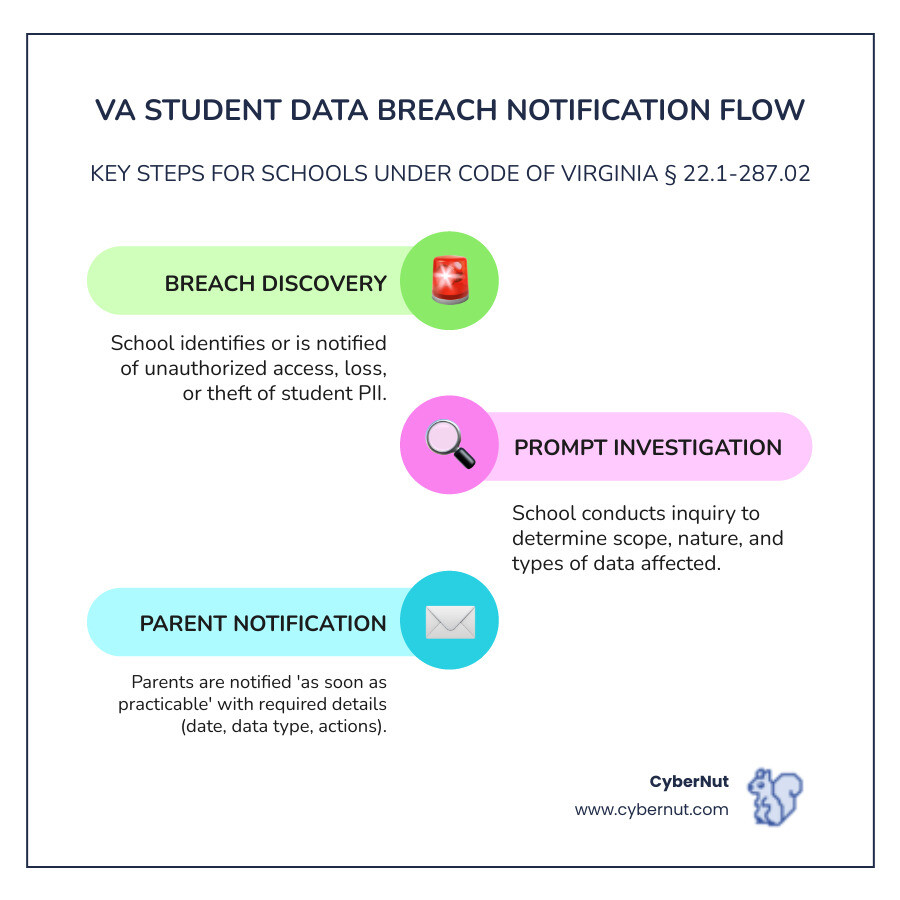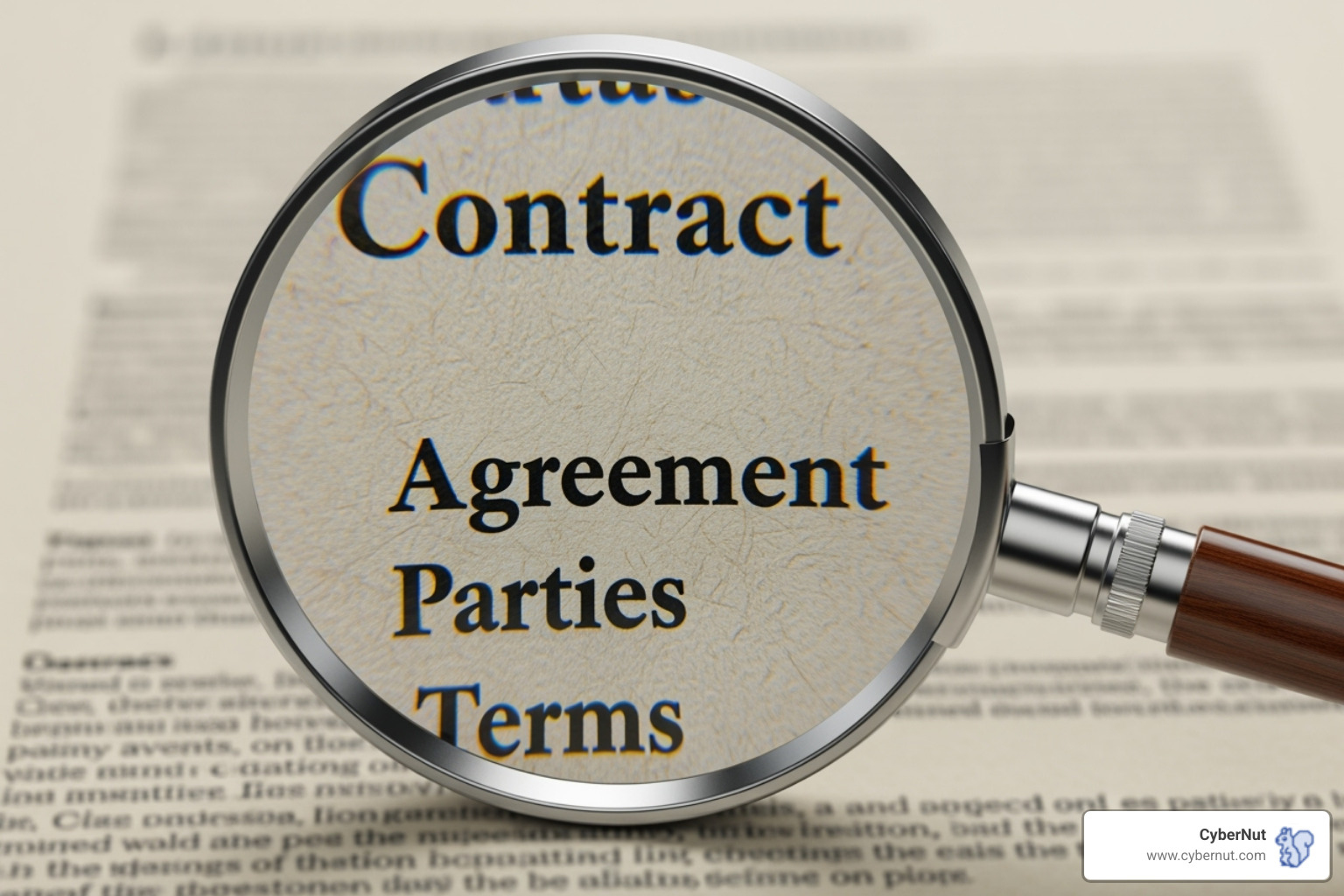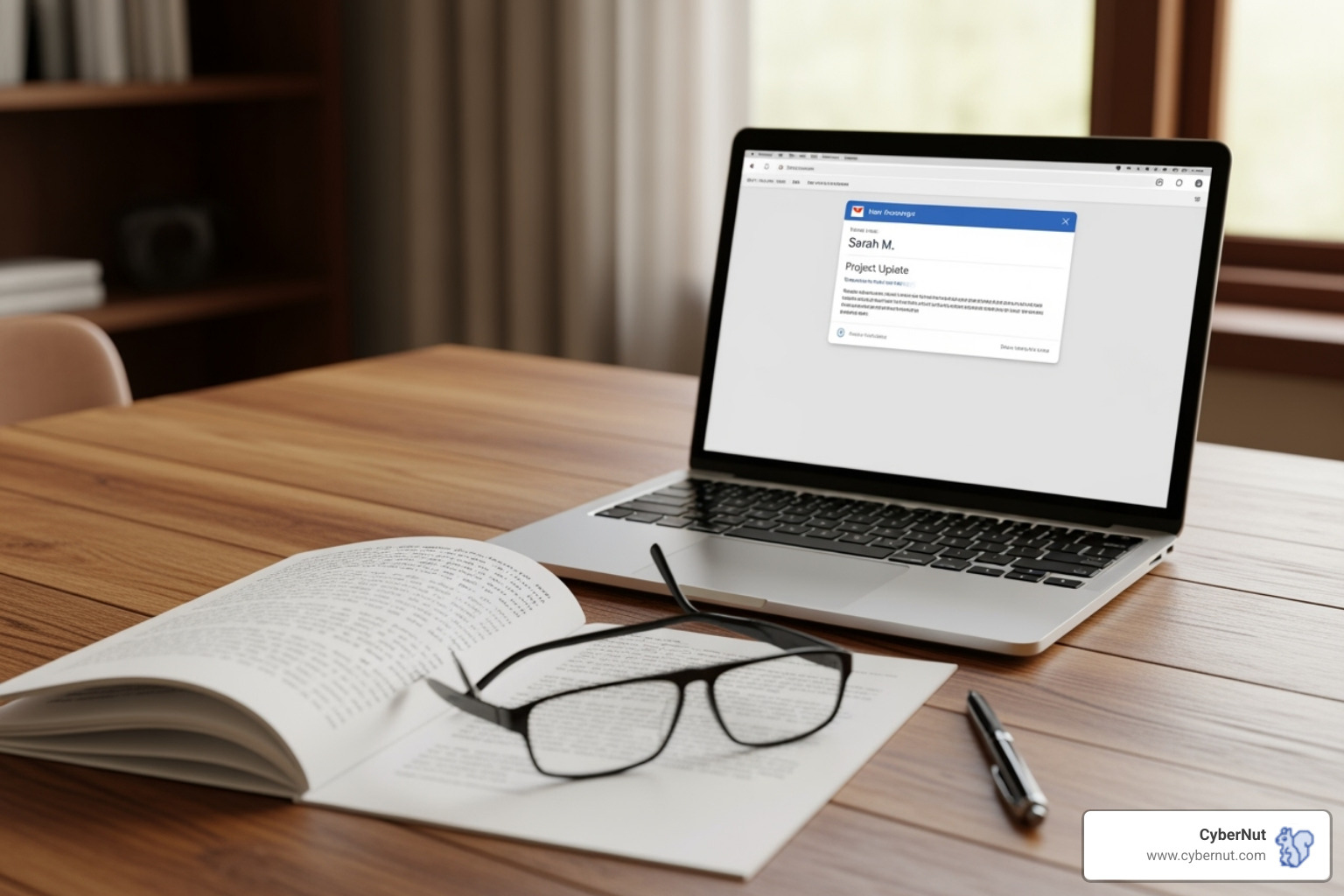
Oliver Page
Case study
August 27, 2025

What to Know About Code of Virginia § 22.1-287.02: Student Data Breach Notifications means Virginia schools must notify parents when student data is exposed, lost, or stolen.
Key Requirements:
As student data breaches become more frequent, Virginia lawmakers have affirmed that parents have a right to know when their child's personal information gets into the wrong hands.
This law, Code of Virginia § 22.1-287.02, complements federal FERPA requirements by adding Virginia-specific notification rules to ensure transparency when data security fails.
For K-12 IT Directors, understanding these requirements is critical for compliance and maintaining parent trust. The law applies not only to major cyberattacks but also to accidental disclosures or third-party vendor breaches that can trigger notification requirements.
Failing to properly handle student data breaches can damage relationships with families, lead to regulatory scrutiny, and create potential legal liability.


Code of Virginia § 22.1-287.02 was created to ensure parents are notified quickly when their child's digital data is compromised. As student information increasingly moves to online gradebooks and learning systems, this law establishes clear rules for protecting it.
The Code of Virginia § 22.1-287.02 applies to both the Virginia Department of Education and local school divisions. It focuses specifically on what happens when electronic records with personally identifiable information are exposed.
The core purpose of What to Know About Code of Virginia § 22.1-287.02: Student Data Breach Notifications is to protect student privacy and keep parents informed of violations. Whether due to a cyberattack or human error, FERPA violations can occur. This Virginia law reinforces federal protections by mandating that schools report these incidents.
When an unauthorized disclosure happens, schools must notify parents, explain the situation, and outline their response. This transparency helps in building trust and strengthens the school-family relationship. The law also promotes school accountability, requiring open communication rather than quietly fixing problems.
Virginia's law protects Personally Identifiable Information (PII), using the same definition as federal privacy laws for consistency. It specifically covers education records stored electronically.
This includes identifiers such as a student's name, parent's name, family address, and other personal identifiers. Technical data like Social Security Numbers and student ID numbers are also protected. The scope is broad to cover evolving privacy threats. Any electronic information that could identify a student, from grades and attendance to health records, falls under these protection requirements.
A "disclosure in violation" occurs when student data is shared or accessed improperly. Schools must act when a breach is "reasonably believed" to have happened, without needing absolute proof.
Unauthorized access includes external hacking and internal staff misuse. Data breaches cover theft, exposure, or misuse of information. Third-party vendor breaches are also included; if a school's educational app is compromised, the school is still responsible for notification.
The law also covers violations of FERPA and other privacy laws, including unintentional disclosure (like a misdirected email) and malicious attacks (like ransomware). Once officials believe a violation has occurred, the notification process must start, even before an investigation is complete.

What to Know About Code of Virginia § 22.1-287.02: Student Data Breach Notifications is centered on transparency. The process begins as soon as school officials reasonably believe data has been improperly disclosed, prioritizing getting essential information to families quickly.
Responsibility for notification lies with either the Virginia Department of Education (for state-level breaches) or the local school division (for district-level breaches). Communication is typically handled by the local superintendent's office.
The law uses a "reasonably believed" standard, meaning officials must act on a credible suspicion of a breach, not wait for absolute proof of harm. The chain of command involves IT staff or administrators identifying a potential breach, reporting it to leadership, and coordinating the parent notification "as soon as practicable."
Virginia's law requires specific, actionable information in every notification to avoid confusion. The notice must include:
These required notification elements provide a clear picture of the incident and the school's response.
Yes, there are specific exceptions designed to balance transparency with practical realities.
These exceptions are not loopholes but carefully defined conditions. Schools must document their reasoning for not notifying parents.
Virginia's Code of Virginia § 22.1-287.02 builds upon, rather than replaces, federal protections like the Family Educational Rights and Privacy Act (FERPA). Think of FERPA as the foundation for student privacy and Virginia's law as the specific blueprint for What to Know About Code of Virginia § 22.1-287.02: Student Data Breach Notifications.
FERPA was enacted in 1974, long before digital records became standard. Virginia's law addresses the modern need for specific rules regarding electronic data breaches.
Virginia's law aligns with FERPA on several core principles:
For more details on federal law, visit the U.S. Department of Education FERPA Page.
Virginia's law fills gaps in FERPA, particularly concerning actions to be taken after a breach occurs.
Key additions from Virginia's law include:
This dual-layer system provides robust protection for Virginia students, offering clear guidance to schools and greater assurance to parents.
While What to Know About Code of Virginia § 22.1-287.02: Student Data Breach Notifications provides legal protection, parents can also take proactive steps. Being informed and asking the right questions helps create a safer digital environment for students.
If you have questions about your student's data privacy, several resources are available:
Voicing concerns helps protect not only your child but also improves data security for all students.
Here are answers to common questions about What to Know About Code of Virginia § 22.1-287.02: Student Data Breach Notifications.
The law requires notification "as soon as practicable." This flexible timeline allows schools to conduct a preliminary investigation to provide accurate information without causing undue panic. It is not a fixed deadline, like 72 hours. Delays can also occur if law enforcement requests it to protect an ongoing investigation. However, schools cannot sit on the information indefinitely and must communicate without unreasonable delay once they have the essential facts.
Yes. Schools are responsible for protecting student data even when it is handled by third-party vendors, such as educational apps or online learning platforms. Virginia law requires schools to have strong data protection agreements with these vendors. These contracts obligate vendors to secure student data and immediately notify the school of any breach. If a third-party app used by the school is hacked, the school district is still required to notify parents.
Receiving a notification can be concerning, but you have rights to help you respond:
Most importantly, follow any remedial advice the school provides, such as changing passwords or signing up for identity protection services.
What to Know About Code of Virginia § 22.1-287.02: Student Data Breach Notifications is a vital tool for partnership between parents and schools in protecting student data. It ensures that when a student's digital information is compromised, parents are kept informed.
This law complements federal protections like FERPA, creating a safety net that mandates quick, transparent action from schools. It empowers administrators with clear guidelines and parents with the right to be notified.
For school administrators, compliance means implementing strong cybersecurity practices, vetting third-party vendors, and having a clear incident response plan to build trust. For parents, it means staying engaged, asking questions, and understanding your rights.
Cybersecurity threats are persistent and evolving, but a collaborative approach between schools, parents, and experts creates a strong defense. Proactive measures are key, as many breaches begin with a simple phishing email. Education and awareness training are the most effective tools against these threats.
If you're ready to strengthen your school's defenses, we can help. Get your school audited for phishing vulnerabilities to identify weaknesses. And to learn more about cybersecurity training for schools that actually engages your staff and students, visit our services page.
Together, we can create a safer digital learning environment where Virginia's students can focus on what matters most: their education.

Oliver Page

Some more Insigths


Back